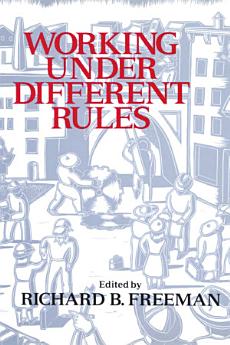Working Under Different Rules
Richard B. Freeman
1994 മേയ് · Russell Sage Foundation
ഇ-ബുക്ക്
276
പേജുകൾ
reportറേറ്റിംഗുകളും റിവ്യൂകളും പരിശോധിച്ചുറപ്പിച്ചതല്ല കൂടുതലറിയുക
ഈ ഇ-ബുക്കിനെക്കുറിച്ച്
For much of the 20th century, American workers were the world's leaders in productivity, wages, and positive workplace conditions. American unions championed free enterprise and high labor standards, and American businesses dominated the world market. But, as editor Richard B. Freeman cautions in Working Under Different Rules, despite our relatively high standard of living we have fallen behind our major trading partners and competitors in providing good jobs at good pay—what was once considered "the American dream." Working Under Different Rules assesses the decline in the well-being of American workers—evidenced by spiraling income inequality and stagnant real earnings—and compares our employment and labor conditions with those of Western Europe, Canada, Japan, and Australia. As these original essays demonstrate, the modern U.S. labor market is characterized by a high degree of flexibility, with rapid employee turnover, ongoing creation of new jobs, and decentralized wage setting practices. But closer inspection reveals a troubling flip side to this adaptability in the form of inadequate job training, more frequent layoffs, and increased numbers of workers pushed to the very bottom of the income scale, into the low wage occupations where much of the recent job growth has occurred. While the variety of works councils prevalent throughout the developed world have done much to foster democratic rights and economic protection for employees, the virtually union-free environment emerging in many areas of the private U.S. economy has stripped workers of a strong collective voice. German apprenticeship programs and the Japanese system of "job rotation" represent more effective approaches to preparing workers for the changing demands of lifetime employment. In addition, workers in European advanced economies and in Canada have greater social protection than Americans. But while this has some cost in unemployment and higher taxes, carefully designed social safety nets do not seriously jeopardize economic efficiency. Working Under Different Rules is an illuminating analysis of the often complex interaction of market institutions, social policy, and economic results. The authors' up-to-date international assessment of unions, wage setting, apprenticeship programs, welfare support, and works councils suggests alternate ways of training, paying, and empowering workers that, if effectively adapted, could facilitate the growth of a healthier American economy and better prospects for American workers.
രചയിതാവിനെ കുറിച്ച്
RICHARD B. FREEMAN is Herbert Ascherman Professor of Economics at Harvard University and program director for Labor Studies at the National Bureau of Economic Research. He is also executive programme director for Comparative Labour Market Institutions at the London School of Economics, Centre for Economic Performance.
ഈ ഇ-ബുക്ക് റേറ്റ് ചെയ്യുക
നിങ്ങളുടെ അഭിപ്രായം ഞങ്ങളെ അറിയിക്കുക.
വായനാ വിവരങ്ങൾ
സ്മാർട്ട്ഫോണുകളും ടാബ്ലെറ്റുകളും
Android, iPad/iPhone എന്നിവയ്ക്കായി Google Play ബുക്സ് ആപ്പ് ഇൻസ്റ്റാൾ ചെയ്യുക. ഇത് നിങ്ങളുടെ അക്കൗണ്ടുമായി സ്വയമേവ സമന്വയിപ്പിക്കപ്പെടുകയും, എവിടെ ആയിരുന്നാലും ഓൺലൈനിൽ അല്ലെങ്കിൽ ഓഫ്ലൈനിൽ വായിക്കാൻ നിങ്ങളെ അനുവദിക്കുകയും ചെയ്യുന്നു.
ലാപ്ടോപ്പുകളും കമ്പ്യൂട്ടറുകളും
Google Play-യിൽ നിന്ന് വാങ്ങിയിട്ടുള്ള ഓഡിയോ ബുക്കുകൾ കമ്പ്യൂട്ടറിന്റെ വെബ് ബ്രൗസർ ഉപയോഗിച്ചുകൊണ്ട് വായിക്കാവുന്നതാണ്.
ഇ-റീഡറുകളും മറ്റ് ഉപകരണങ്ങളും
Kobo ഇ-റീഡറുകൾ പോലുള്ള ഇ-ഇങ്ക് ഉപകരണങ്ങളിൽ വായിക്കാൻ ഒരു ഫയൽ ഡൗൺലോഡ് ചെയ്ത് അത് നിങ്ങളുടെ ഉപകരണത്തിലേക്ക് കൈമാറേണ്ടതുണ്ട്. പിന്തുണയുള്ള ഇ-റീഡറുകളിലേക്ക് ഫയലുകൾ കൈമാറാൻ, സഹായ കേന്ദ്രത്തിലുള്ള വിശദമായ നിർദ്ദേശങ്ങൾ ഫോളോ ചെയ്യുക.







